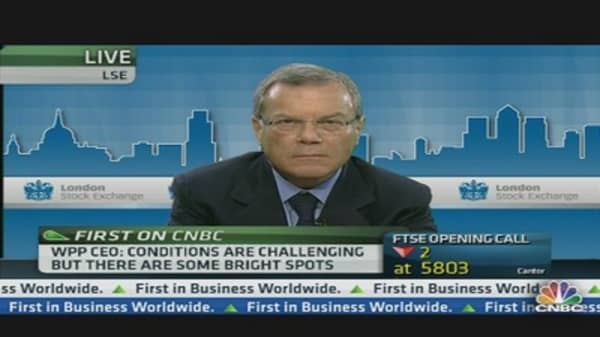WPP cut its revenue outlook for the second time this year on Thursday on Europe amid continuing pressure on customer budgets in Europe and North America, WPP CEO Sir Martin Sorrell told CNBC, highlighting four "grey swans" that threaten the global economy.
The "grey swans", events that can be predicted to a certain extent, include the ongoing crisis in the euro zone, political concerns in the Middle East, the health of the U.S. economy and the uncertainty around China's economic outlook.
The company revised its outlook after recording a slowdown in third-quarter like-for-like revenue growth, the key industry metric. WPP now expects full-year like-for-like revenue growth of 2.5-3.0 percent, compared with a forecast of 3.5 percent at the end of August.
In mid morning trade WPP stocks were the worst perfomers on the FTSE.
WPP's growth forecast is no exception. The majority of S&P companies have missed analyst forecasts for their quarterly earnings in the third quarter, and this downward trend won't slow anytime soon, he said.
Sorrell said that monetary action taken by the European Central Bank, the Federal Reserve, and the Japanese central bank may make the market feel better, but didn't reassure those in "the real world".
"There general concern about the state of the economy, both in faster growing markets and in western continental Europe," Sorrell said.
Those concerns are even greaters for next year because there will be no major events that boost spending like the Olympic Games.
In Sorrell's opinion the "real issue" is America. "If we saw a resolution of the 'fiscal cliff', things would be better, but the problem with the election is we may well see a deadlocked Congress no matter who wins."
Sorrel was not entirely downbeat however.
"If you're not just looking at central and Eastern Europe, there are some geographic and functional bright spots," Sorrell told CNBC.
"[Business in] Asia, Africa and the Middle East continues to be better than expected, and the global economic slowdown hasn't impacted Asia and Latin America as much as we thought it would."
The CEO also said that "advertising, media investment management, branding and identity healthcare driven by digital spending continue to be strong as well."



